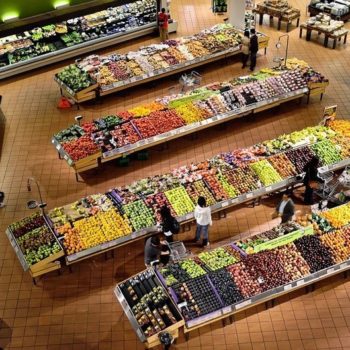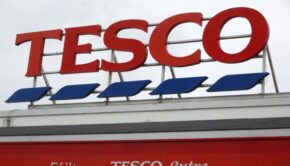Tesco share price falls despite sales growth in Ireland

As the UK, Ireland, the EU and everyone in between continues to prepare for Brexit, analysts are keeping a close eye on supermarket share prices, as the big players lay the groundwork for the still-unpredictable outcome.
24 June 2019
In the 12 weeks to February 24 2019, Tesco’s share price fell by 0.44 percent, closing at 227.50p per share. During this period, Britain’s biggest grocer also lost market share and underperformed against the wider UK market, where the FTSE 100 index gained 26.31 points, closing 0.37 percent higher at 7,130.62.
However, in Ireland specifically, Tesco’s sales grew across the same period, according to Kantar numbers. These same figures also revealed that the Irish grocery market grew by 3.5 per cent in the 12 weeks to February 24, partially as a result of a strong performance from Tesco.
Given the current uncertainty surrounding Brexit and its potential impacts on the retail market, the eyes of CFD traders are on retail shares at present, with CFD traders in a number of markets aware of the market volatility caused by policy announcements and Brexit-related news events.
Brexit and the Irish grocery market
 Tesco is keen to put the Irish grocery sector on a solid footing amid ongoing Brexit uncertainty, further bolstering the growth we’ve seen in the first quarter of the year. Tesco’s contribution to this market growth cannot be under-estimated, with sales rising 1.1 percent during the aforementioned period.
Tesco is keen to put the Irish grocery sector on a solid footing amid ongoing Brexit uncertainty, further bolstering the growth we’ve seen in the first quarter of the year. Tesco’s contribution to this market growth cannot be under-estimated, with sales rising 1.1 percent during the aforementioned period.
However, although Tesco remains a driving force behind the market growth, its market share fell slightly (down 0.2 per cent to 27.7 percent) thanks to further strong performances from Aldi (which now has an 11.2 percent market share) and Lidl (11 percent). Some of the success of Aldi and Lidl during the period can be attributed to rapid and aggressive expansion from both chains, while part also seems to be coming from the greater value they provide some customers on budget items.
As a direct result of this, we have seen Tesco respond by boosting its value credentials, including ‘The 800’ campaign, which has been a major contributing factor in customers buying two percent more goods per visit, on average. Here, Tesco has placed a greater focus on the scale of value available on everyday products.
To further safeguard against the backdrop of Brexit uncertainty, Tesco has also retained the fridges that it usually rents over the busy festive period, and has begun the process of hiring extra customs officials to help get fresh produce fast-tracked, according to a report released by Kantar. Finally, it has been suggested that the company has also put detailed plans together to look at the potential for stockpiling produce to minimise the impact of Brexit and to try and pre-empt far less predictable shopping behaviour from customers.
12-month price targets for Tesco
With the UK’s current Brexit date set for October 31 2019, market analysts and experts are expecting short- to medium-term price uncertainty and volatility. In terms of 12-month price targets for Tesco, analysts for the Financial Times have set a median target of 275.00p on the shares. The highest market estimate was 305.00p per share, with the lowest just 200.00p per share.
Overall, the consensus forecast from the 23 investment analysts polled was that Tesco shares would outperform the market over the coming twelve months. Over the past year, the group’s shares have added under seven per cent to their value.



 Print
Print



Fans 0
Followers